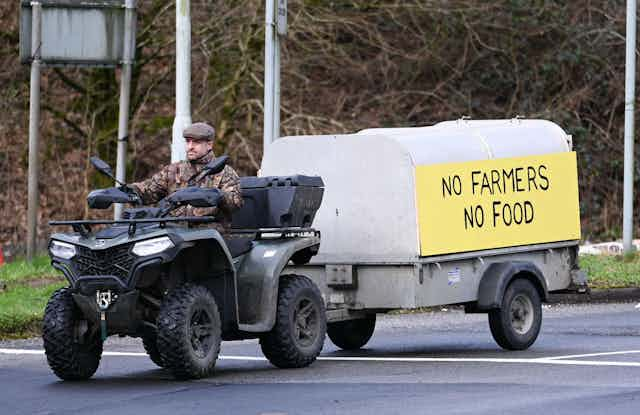Farmers in Wales have been taking to the streets in a series of protests against the sustainable farming scheme (SFS), which the Welsh government is proposing as a post-Brexit replacement to the EU’s common agricultural policy.
They’ve blocked motorways with convoys of tractors and held large rallies in the capital, Cardiff, leaving behind thousands of empty wellington boots to symbolise job losses. The tactics appear to have worked, with under-pressure ministers reportedly working on an update to the policy.
The conflict over the SFS is about more than policy, however. It reflects perceptions that rural communities are misunderstood and ignored by politicians. We have previously conducted cross-country studies in Europe and found a pervasive belief that governments show bias towards urban over rural areas. We find the same in our new polling about the Welsh government – something that should be considered in the debate over the SFS.
A Europe-wide divide
Events in Wales are part of a wave of protests across Europe. Some are against changes to regulations and subsidy schemes as part of a push towards net zero, others to protect domestic agriculture against newly tariff-free Ukrainian imports.
This is only the latest manifestation of “rural resentment” – beliefs that rural communities are economically, socially and politically marginalised. These sentiments have been associated with support for former US president Donald Trump and radical right parties across Europe.
Rural areas in the UK have not generally been seen as groundswells of discontent, however. Political discourse in recent years has focused more on heavily Brexit-voting urban areas in the north of England.
In 2020 we ran surveys in the UK and four other European countries (France, Germany, Spain and Croatia) and found that in the UK, people were not as concerned as in other countries about the government having a pro-urban bias. They were more concerned about bias towards London, the national capital.
It has not yet been fully explored whether people think the devolved governments in Northern Ireland, Scotland and Wales are biased towards urban areas but this is a crucial question, given their responsibilities in key areas like agriculture.
Our current research investigates this, and our preliminary findings suggest that people do hold this view. In a survey of 728 Welsh adults from December 2023, 53% said that the Welsh government favoured urban areas and only 18% thought it favoured rural areas.
As we found in the European study, alongside rural resentment, there appears to be a high level of urban sympathy. Indeed, in the Welsh survey, people in urban areas were just as likely as those living in rural areas to say the government had an urban bias.
The real divide is political, but not party political. Discontent cuts across party lines, but relates more closely to low trust in Welsh politics and also, to some extent, to devolution-sceptic attitudes.
Anti-Labour or anti-politics?
As political scientists are prone to saying, “partisanship is a hell of a drug”. Are these attitudes just about disliking the party in power? In our cross-country study, we have not found large partisan differences.
In Wales, there are some differences but party supporters are still very happy to criticise governments run by parties they support. For instance, 70% of Conservative supporters believe the UK government is urban-biased, and 48% of Labour supporters think the same of the Welsh government (which is Labour-run).
One notable distinction is that radical right (UKIP/Reform) supporters were more likely to say there was a very high level of bias from the Welsh government, and Plaid Cymru supporters to say the same of the UK government. Partisanship might affect the intensity of beliefs, but the tendency to think of governments as biased is fairly widespread.
The most robust association we found in the cross-country study was between the perception of bias and trust in politics. This carries over into the Welsh study: lower trust in Welsh politics is associated with urban bias perceptions, particularly with stronger perceptions.
We don’t know exactly what causes what, but the link to low trust suggests it will be difficult for politicians to persuade voters that they are bearing rural interests in mind when devising policies like the SFS.
It can be healthy for people to be critical of specific governments, but we may grow more concerned if they reject their institutions. In Wales, a sizeable group (around one-fifth) would abolish the Welsh parliament – and it is among this group that perceptions of an urban bias are high. This points to the possibility that perceptions of bias undermine legitimacy.
Risk or opportunity?
The dispute over the SFS presents risks for both Labour and the Welsh devolved government more broadly. For now, Welsh Labour has a huge poll lead over its rivals, which may cushion against electoral punishment even if it ploughs ahead with the SFS.
But doing so could entrench lasting perceptions of Labour as a party of and for the cities in a way that narrows its appeal. What’s more, the risk of allowing perceptions of anti-rural bias to fester is that it brings the wider political system (including the Welsh devolved institutions) into disrepute.
A more optimistic view might see the dispute as an unusual opportunity. Where voters might cynically expect government to run roughshod over rural complaints, Labour could proceed sensitively and carefully, keeping an ear to the ground for rumblings of discontent – and hopefully avoiding any more damaging, high-profile setbacks to the net zero agenda.

